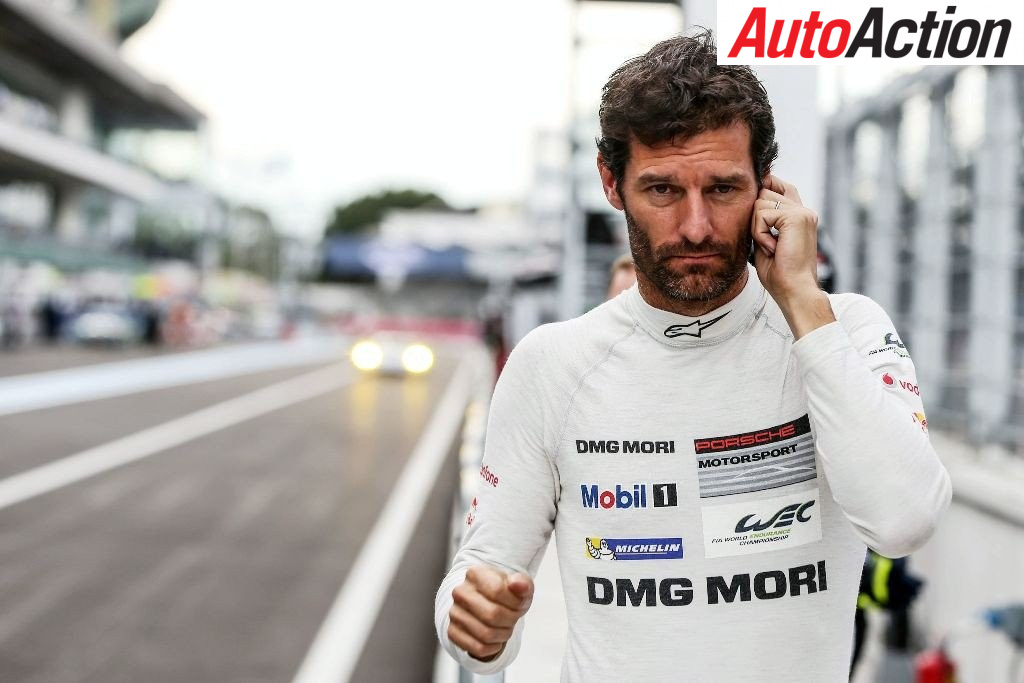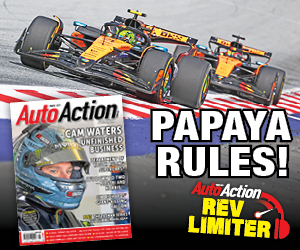Mark Webber: Life Begins at 40

Mark Webber has had one of the biggest years of his life – he turned 40, got married and defended his World Endurance Championship. Then he announced his retirement from the cockpit. A lot lies ahead, even if he is not a racing driver any more… By Phil Branagan
AA: Congratulations, on a number of fronts.
MW: Thanks. It’s been a big year. The 4-0 and getting married, stopping racing… it’s been a good one!
AA: Your statement at the time you announced your retirement said you had retired from ‘professional motor racing’. Does that mean you might dabble in other things?
MW: No, it means that there might be some ‘fun stuff’. But I don’t want to get paid for driving a racing car any more, basically. I do not want to have anyone telling me that I am doing a bit of a rough job! ‘You must go and look at the data, you must do this!’ None of that. If I do do anything, it will all be on my terms.
Rallycross or something – but I will not be doing anything serious.
AA: On a case by case basis? Something like a Targa or a Race of Champions?
MW: Nope. I don’t know. I am not even thinking about it. At the moment I am using all my energy to pull my helmet on, I am not in a hurry to figure out a new role on anything like that.
AA: That leads me to speculate that you picked exactly the right moment to retire. It sounds like your motivation and abilities are coming to a conclusion at the same time?
MW: They are. I have had a good old crack at it.
I get in the car now and again, and I do not ‘spin my wheels’, so to speak. Look; I could go a bit longer – and Porsche have been sensational. I have loved working with Timo [Bernhard] and Brendan [Hartley], that has been loads better than I thought it would be. In Formula 1, the come-down has been… they all told me, all the ‘Retired Boys’ told me that coming down from F1 would be tricky. And they were right – it IS hard to come down from Formula 1.
But the Porsche thing has been great – loads better than I thought it would be. The cars are awesome and the fun I have had with Timo and Brendan along the way; that was even better than I thought it would be. I have really enjoyed that.
AA: How do you replace the rush? Half your life has been about going out there and going as fast as you can, against tough opposition. How do you replace that?
MW: Ageing is a great thing sometimes!
Most of our career is like that. But you get older, you see things differently and you have different priorities. The upsides now are, for me, not outweighing the downsides. There is still a risk in play, especially at Le Mans, with a lot of ‘gentleman’ drivers. I put that into the mix, in making a decision.
Even with our category, there will be less tyres per weekend next year – and less of this, less of that. They have taken a lot away from what the driver can do, we are getting told more and more what we can do. When you get older, you are not as… enthusiastic about some of those decisions.
I will replace it with other things. I love my mountain bike racing; I will keep doing that. No, it’s not like in a racing car, but you can’t do things forever. You have to let it go. You can’t be out there, just cruising around – and really, you are stopping someone else having the opportunity.
AA: That was one of my next questions. There are a few examples of guys out there having a ‘soft exit’ from F1, and other high-level categories in the sport. You seemed to have timed this very well.
MW: It is hard for me to talk for other people.
Rubens [Barrichello] thinks differently to me. Rubens loves what he does, I don’t want to be doing what he is doing now, at that age. But he loves it, and fair play to him. He doesn’t want to do the other things that I do. Fair enough.
It’s the same with David [Coulthard]. He wanted to go off and do the DTM. That was for a reason, for him to pursue other commercial aspects off the back of that – and that worked very well for him. There are reasons why and how we roll out the back of this incredible journey that we have.
Some guys do extend that. But I have always envisaged that I was not going to be one of those guys who needed that.
Stepping down is a big thing. You are stepping down in categories, you are not feeling as good. It’s a big thing! The cars are not as fast as the ones you are used to.
AA: You mentioned Le Mans. There are two races that you never won – Le Mans and the Australian Grand Prix. I don’t want to use the word ‘regret’ but, do you feel like you missed something?
MW: To win those? Yes, I would have liked to.
You always want to win your home Grand Prix. Jenson [Button] and I always joke to each other, I won the British Grand Prix loads, and he won the Australian Grand Prix loads! If we could flick one of those wins to the other, that would be nice!
I always enjoyed driving at Albert Park. It just wasn’t meant to be.
At Le Mans, that’s a bit different. I always feel like there are so many variables. I honestly feel like a part of me has been there on the middle step of the podium, because of my involvement in the [Porsche] program.
I feel that this year was my best year there. I was really happy with the way I drove and I did everything that I could do to put myself in a position to win the race. We had a technical problem; that happens.
It’s a long, long race, and a tough old race. But it is not going to change my trophy cabinet too much – I am happy with what I have contributed to Porsche on the frontline.
I know what it takes to win. I haven’t done it but I have been there. I know how to win Le Mans, and that has been a great experience for me. But it wasn’t meant to be.
AA: And you and Jenson can always swap trophies for a little while, now and then.
MW: We can!
AA: What now? There are ambassador roles, there are media roles here with Channel 10 and in the UK with Channel 4, tell me about the satisfaction you get out of those things.
MW: It was a no-brainer to continue with the Porsche relationship. That is sensational. They have been so supportive since I arrived and now, with the new role, to be involved with the racing side and some on the road car side, pushing a lot of products on a global scale. And it’s easy, because it is a brand that I firmly believe in. they are going gangbusters at the moment, and selling a lot of road cars.
The Channel 4 side, it’s a business I know well, the sport I know well. It’s a bit of fun to be working with DC, live telly is always fun, we have some decent banter. They want me to do quite a bit more next year but I haven’t really made my mind up, with how much I will be doing. I will be doing [Channel 10] in Melbourne next year.
I am doing a lot of stuff with Red Bull, at different events around the world in the coming year. There are a few other pending deals that will be in the next few weeks, so I will be a busy boy!
AA: I am not mad on making comparisons with Jackie Stewart but he has been as busy since he stopped driving – and you have known him for a long time.
MW: It is great to be able to have counsel from JYS. He is a very astute businessman and he knows how to work his brand very well. You would be silly not to take counsel from someone like him.
There’s only one JYS. We all know that and I am forever thankful for the advice he has given me throughout my career, and in this part of my career.
There is a glide path to extracting yourself out of the cockpit. What do you do? Of course, I love spending my time in Noosa – but do you want to be there for eight to 10 months of the year? Absolutely not. My life, and the business I am in, at this time in particular, some of that is in Australia but a lot of it is back in Europe and overseas.
There are some other Aussie Grit ventures coming out in the not-too-distant future, so I am looking forward to those.
AA: Considering you met Jackie Stewart when you were a Courtesy Car driver at Goodwood all those years ago…
MW: Yeah! I fooled him for a long time!
AA: If I can borrow something from F1 Racing, you once were in a feature about how F1 drivers would spend their ideal day. Your perfect day included driving an F1 car, at Silverstone, on Qualifying tyres. How do you get past that?
MW: They are great memories to have, especially in an Adrian Newey car, in those circumstances. It was great to be able to feel that, incredible.
Those cars, there was a time when they were below 600 kilos and over 900 horsepower. They were absolute beasts.
We often talk about it, with the guys who were there in that era. The cars were very safe, obviously, but if you look back in Jackie’s era, and Niki’s era, the cars were incredibly dangerous. The speed of the cars, I was very lucky to drive in an era where that was exceptional.
You can’t replicate that. That’s over – it’s gone, been and gone. Get over it.
AA: As a member of the media, and I have been watching your career for a while I am gratified by a number of people who have said similar things – you have not really changed.
MW: [Laughs] I have had sensational people around me all the way through.
There is a tricky time, because I had most of my success very late in my career. That was probably fortunate, because you can have your head screwed on a little bit more. I think that it can be tricky for youngsters, because if you have your successes up front, I can imagine that would be quite hard to deal with. Not seeing the reality of just how small the bubble actually is, and not accepting the reality of what it actually is…
I think it probably helped me along the way that I had to wait a long, long time before I got some results. I would love to have had them earlier but it was not meant to be. Maybe that was the reason why I could be a little more measured and level-headed about the whole thing.
AA: And, looking at what we see now, with teenage drivers at the highest level of the sport, in F1 and drivers being pushed to such a level, that’s great if they can handle it. But is it actually doing the sport a bit of a disservice?
MW: It has all moved on. We have simulators and there are so many sensors on the cars, the driver is obviously still there. But the driver is a device in the car has to then go out and operate all that.
Before it was very much data-driven by the driver – talking to the engineers, about making the car go faster. Now it is about the engineer and the sensors telling the driver how to get the best out of the car. So you can put inexperienced guys in there, they can fill that M.O. That is their role, and that is the way that the sport has gone.
AA: Twenty years. It has been a heck of a ride. Well done, and thanks for flying the flag so high. You’ve done well.
MW: Thanks mate. It’s been good. I have had a few good dudes in touch, and they have been pretty happy. That has been a bit of a surprise, really.
It’s been a real honour and I have enjoyed the ride.



